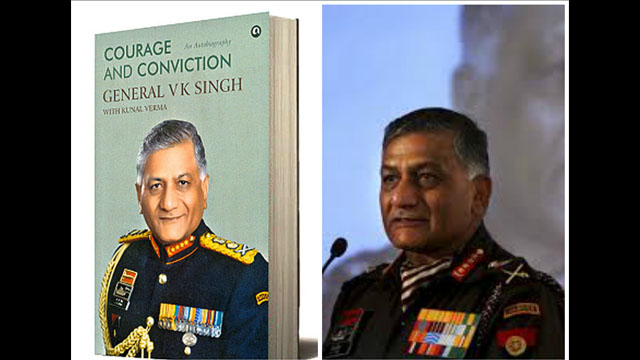Former army chief Gen V.K. Singh said in his autobiography that “a very senior bureaucrat” in the Prime Minister’s Office was “orchestrating” the age row that marked the last months of his tenure.
Former army chief Gen V.K. Singh said in his autobiography released Friday that “a very senior bureaucrat” in the Prime Minister’s Office was “orchestrating” the age row that marked the last months of his tenure.
In “Courage and Convictions”, the retired general’s autobiography published on Friday, Singh writes in detail about the age row, and says that the second hearing of his petition in the Supreme Court came as a big blow.
Singh said media was suggesting at the time that he should resign, but he had been told by then president Pratibha Patil: “You must carry on the work you are doing.”
He said that the name of the new chief is normally announced two months prior to the retirement of the serving chief. However, the announcement of his successor was made much in advance, after an interview he gave to a magazine concerning the outcome of his petition on the age controversy.
“I still had three months to go, and the Ministry of Defence had to settle the little matter of answering my statutory complaint. Lo and behold! The next morning, the PMO issued the statement, proving once and for all that this was a government that could work at lightning speed,” the general writes.
“By now, there was little doubt that a very senior bureaucrat in the PMO was orchestrating the entire age issue. Ever since I blocked the Tatra files, the name of the person had been cropping up regularly. Not only was he involved directly with the PSUs where there was direct evidence linking him to plots given to his family in the BEML complex, almost every move of the government seemed to have originated from the same shadowy quarters,” Gen. Singh says in his book.
The former army chief claims that the senior bureaucrat “was also dropping hints that the age issue had been raked up by one of the former chiefs at the behest of the wife of a very important political personality.”
“There were murmurings that the relatives of a senior PMO bureaucrat had been given plots in the BEML housing society and the son of a top official at the Planning Commission had been living in the BEML guest rooms for more than a year,” Gen. Singh said.
Singh said he was approached with a bribe to clear the Tatra files (relating to trucks for acquisition by the army), in what was obviously a smokescreen.
Singh claimed that the Supreme Court had said “nothing at all in its order”.
“They had simply stated that the government of India letter rejecting the statutory complaint was withdrawn. Though I knew this had happened, its actual import did not sink in for some time. The statutory complaint was alive, the government of India had to answer it. They still had to fix my date of birth as per legal practices,” he says in the book.
Singh said he had considered resigning, but had later brushed aside the thought.
“Right from the outset, I had known that I was up against a system that either expected me to conform to their accepted age-old practices or just looked the other way,” he says.
“The age issue had been brought into play with certain objectives, but as I moved up the chain of command towards the very top, it had become the one and only weapon my adversaries had to neutralise me,” he said.
Singh alleged that PSUs function in a manner that defies logic. He said the government wants them to show profits, which is impossible if they follow normal trade practices.
“Hence over the years, they have devised a methodology of fictitious pricing to enable them to do so. Nobody else in their right mind would accept these rates, so the armed forces are their bunnies through the bureaucrats,” he said.
In the book, the former army chief also speaks about the “leak” to the media of his letter to the prime minister focusing on shortages plaguing the army.
Singh, the first chief of the Indian Army to take the government to court, had argued that an error in documents when he enrolled in the National Defence Academy in 1965 had recorded the wrong year of birth; he had, however, on three occasions, accepted the misrecorded date.
V.K. Singh’s autobiography was co-written by writer-filmmaker Kunal Verma.
IANS





